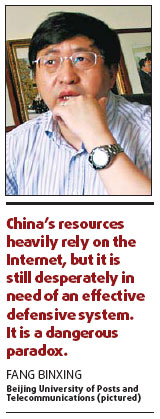China at the Mercy of Global Hackers
Adjust font size:
Cyber technology has fast evolved into a weapon with lethal potential, so much so major nations are pumping billions of dollars into upgrading defense systems to make them digital fortresses.
But while the United States has put the danger of cyber attacks at the top of its national security agenda along with the nuclear threat, defense analysts have warned China's lack of preparation against digital terrorism has left the country "extremely vulnerable".
"In the age of information, a nation's security would be at serious risk if its information systems were attacked, or the flow of information were interrupted," said Professor Yu Xiaofeng, a specialist in non-traditional security at Zhejiang University in Hangzhou.
"In a worse-case scenario, a security breach could result in the breakdown of the energy supply and collapse of the financial system, not to mention a collapse of the national defense capability."

China's reluctance to merge its military and civilian resources, partly because the former believes it would substantially weaken the defense of its network, has been heavily criticized, with many experts saying it has left millions of computers and billions of yuan at risk.
"With almost 300 million Web users, China has one of the world's largest information infrastructures, while its information market has great potential," said Professor Yu. "But the capability to defend China's information and cyber security is extremely weak and many of its online applications remain vulnerable to assault."
Across the Pacific Ocean in the US, the White House has appointed its first "cyber tsar" to watch over security threats via the Internet. The Pentagon, which claims it is the victim of 44,000 cyber attacks every year, is also recruiting ex-hackers for its new strategic Web command.
The taskforce will not only eradicate potential vulnerabilities in its own sensitive computer networks, but also find back doors into the digital fortresses of potential enemies.
The US already has a growing number of computer weapons in its arsenal and is preparing strategies to be used alongside conventional weapons as major deterrents in a wide variety of possible scenarios, the New York Times reported.
The Reuters wire service also revealed US President Barack Obama's administration is complementing its military network with civilian resources by building up contacts with cyber-security software firms such as Symantec Corp and McAfee Inc, as well as working with traditional defense contractors like Northrop Grumman and Lockheed Martin, and technology specialists CACI International.
"It is interesting how the US defense officials compose their cyberspace strategy, especially amid the financial difficulties in the US and the proposed defense budget changes for the Pentagon," said Li Daguang, a senior military expert at the Beijing-based National Defense University.
A similar national cyber-security center will also be set up in Britain this month, its media reported last Sunday.
The Internet has evolved from a simple tool to connect the "Global Village" to a virtual battlefield that sees computer users regularly attack each other. US President Obama even warned it has the power to be a potential "weapon of mass destruction" in times of war.